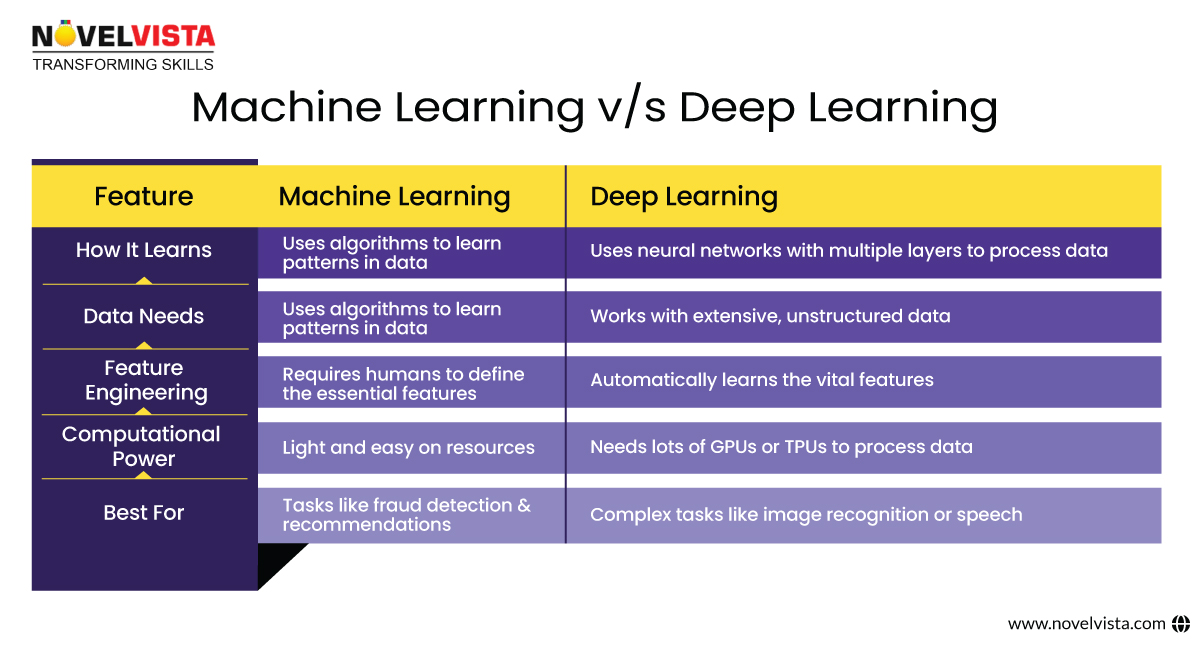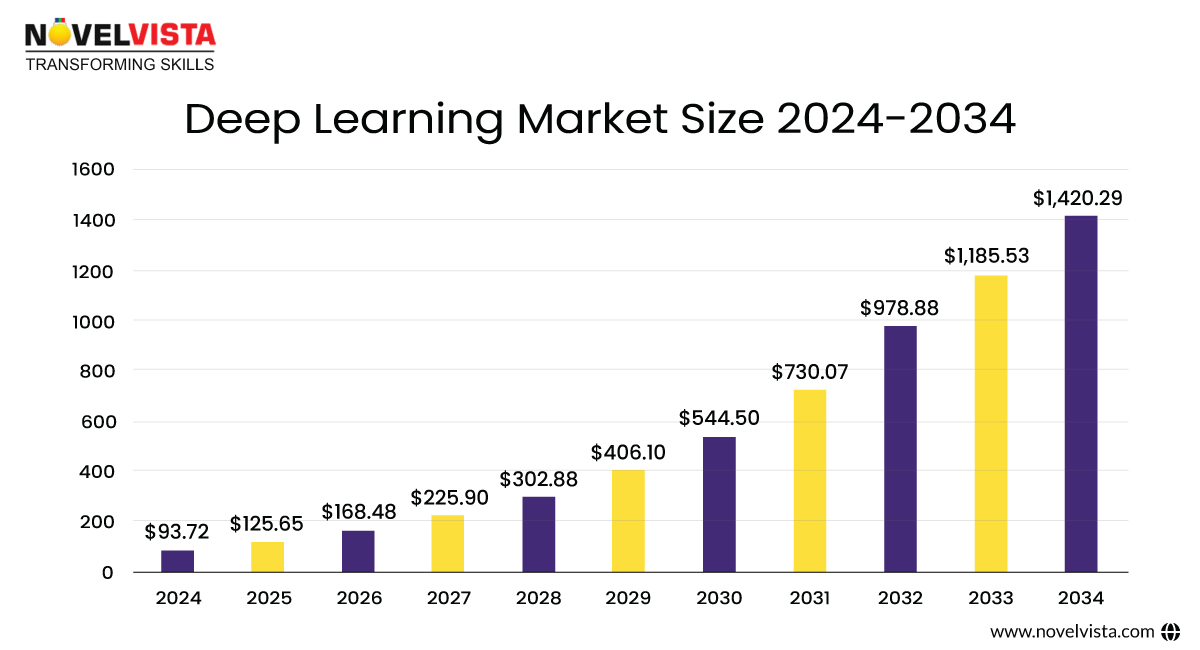Before getting into the details of Deep learning on AWS let us understand what deep learning actually is. Deep learning is a class of machine learning algorithms that uses multiple layers to progressively extract higher-level features from the raw input. For example, in image processing, lower layers may identify edges, while higher layers may identify the concepts relevant to a human such as digits or letters or faces.

Organizations are increasingly turning to deep learning because it allows computers to learn independently and undertake tasks with little supervision, promising extraordinary benefits for both science and industry. Unlike traditional machine learning, deep learning attempts to simulate the way our brains learn and process information by creating artificial "neural networks" that can extract complicated concepts and relationships from data. Deep learning models improve through complex pattern recognition in pictures, text, sounds, and other data to produce more accurate insights and predictions.
Ready to find out? Let’s explore these answers together!
This blog is here to make AWS Deep Learning easy to understand, even if you're new to the game. We'll explore how AWS powers Deep Learning, real-world applications, and smart ways to save costs. By the end, you'll see how AWS can help you build intelligent systems without the headache. Let’s get started!
Let’s start with a quick comparison! Machine learning and Deep Learning are part of Artificial Intelligence, but they approach problems a bit differently.

In simple terms, Machine Learning is like a skilled carpenter who makes something valuable with handpicked tools. Deep Learning is like an architect who uses advanced technology to build impressive, large-scale projects.
We offer incredible AWS Services to power AWS Deep Learning Workflows. Here’s how AWS helps:
With AWS, whether you’re a beginner or a pro, you can rapidly learn How to Use AWS for Deep Learning and scale your projects effortlessly.
Using cloud computing for Deep Learning allows large datasets to be easily ingested and managed to train algorithms, and it allows Deep Learning models to scale efficiently and at lower costs using GPU processing power. By leveraging distributed networks, Deep Learning on the cloud allows you to design, develop and train Deep Learning applications faster.
Deep Learning algorithms are designed to learn quickly. By using clusters of GPUs and CPUs to perform complex matrix operations on compute-intensive tasks, users can speed up the training of Deep Learning models. These models can then be deployed to process large amounts of data and produce increasingly relevant results.
Deep Learning neural networks are ideally suited to take advantage of multiple processors, distributing workloads seamlessly and efficiently across different processor types and quantities. With the wide range of on-demand resources available through the cloud, you can deploy virtually unlimited resources to tackle Deep Learning models of any size.
Deep Learning frameworks such as Apache MXNet, TensorFlow, the Microsoft Cognitive Toolkit, Caffe, Caffe2, Theano, Torch and Keras can be run on the cloud, allowing you to use packaged libraries of Deep Learning algorithms best suited for your use case, whether it’s for web, mobile or connected devices.
AWS makes sure you’re never short on tools or frameworks to make Deep Learning easier:
It’s like having all the right ingredients ready when you’re about to cook up something amazing.
Deep Learning is well suited for a wide variety of artificial intelligence use cases, such as:
By training algorithms with millions of labelled images, Deep Learning neural networks can successfully identify subjects as well or even better than humans, leading to advanced capabilities like rapid facial recognition.
Varying speech patterns and accents in humans make speech recognition difficult for computers. Deep Learning algorithms can more easily determine what is said. This capability is used today in Amazon Alexa and other virtual assistants.
Deep Learning helps computers understand regular conversations, where tone and context are critical to communicating unspoken meaning. With algorithms that can detect emotions, automated systems such as customer service bots can decipher and respond to users usefully.
An early success of Deep Learning was the development of systems that track user activity to develop personalized recommendations. By comparing the aggregate activity of numerous users, Deep Learning systems can even identify totally new items that might interest a user.
AWS Deep Learning tools aren’t just impressive—they change how we live and work. From saving lives in healthcare to making online shopping feel personal, these tools bring big ideas to life. They help businesses tackle real-world challenges with more intelligent systems and faster insights. Here’s how:
Doctors use Deep Learning to analyse medical images and find diseases faster. AWS helps by providing tools like SageMaker to make these models smarter.
Ever wonder how online stores recommend the perfect product? That’s Deep Learning at work, powered by AWS Deep Learning Tools.
Banks use AWS Machine Learning to catch fraud by spotting unusual patterns in transactions.
Think of chatbots like Alexa they use Deep Learning to understand and respond to what you say, even detecting emotions.
Automated tagging for videos or audio files makes content easier to organise and find.
Deep Learning functions drive innovation, whether saving lives, simplifying shopping, or making tech more user-friendly.
AWS Cost Management and Performance Optimization can be efficient if you know a few tricks:
With these tips and AWS Certification resources, you’ll stay ahead of the game while managing costs like a pro.
Stats

Deep Learning is reshaping the future of technology, and AWS is correctly at the centre of this revolution. But how could we prepare for what’s coming next while tackling the hurdles along the way? Let’s have a glimpse of the exciting future AWS trends and the challenges you might face when working with Deep Learning. Also, learn how to tackle them like a pro!
AWS is continuously evolving to make Deep Learning faster, more innovative, and more accessible. Here are some trends to watch:
You know ChatGPT and DALL-E, right? These generative AI models are everywhere. AWS is helping businesses to create their own! With tools like SageMaker and custom AI chips (Inferentia and Trainium), AWS enables you to build robust AI systems without breaking the bank.
Imagine self-driving cars making instant decisions or smart devices that understand you better than ever. Thanks to AWS IoT Greengrass and edge computing, Deep Learning models can now work right where the action happens, reducing delays and boosting performance.
Not a coder? No problem. AWS’s SageMaker Autopilot is here to give a helping hand to everyone. You can build and install models without writing a single line of code. Just point, click, and let the magic happen!
As AI evolves, AWS paves the way for hybrid solutions with tools like AWS Outposts. These tools seamlessly blend cloud and on-premises resources. It helps to power even the most complex deep-learning tasks.
AI is exciting, but what about the planet? AWS is leading the charge in using renewable energy and offering tools to help businesses reduce their environmental impact. So, you can innovate while staying green!
Even with all the cool tools, Deep Learning has its share of challenges. But don’t worry; AWS has solutions for almost everything!
Deep Learning thrives on data, but managing massive datasets can feel overwhelming. Enter Amazon S3 for storing it all and AWS Glue to clean and prep your data like a breeze.
Running GPUs for hours isn’t cheap. AWS offers Spot Instances that slash costs by up to 90%, and tools like SageMaker Debugger help you avoid wasting resources.
TensorFlow, PyTorch, MXNet, where do you even begin? Start simple with Deep Learning Containers, which are pre-loaded with all the necessary frameworks. And don’t forget SageMaker Studio, your go-to hub for learning step by step.
Deploying a model sounds fancy, but it can get complicated. That’s where SageMaker shines, offering one-click deployment. Pair it with CloudWatch to monitor your model like a pro.
As your projects grow, so do the demands. AWS’s Auto Scaling Groups and Elastic Load Balancing take the hassle out of scaling, so your models can pick up anything you throw at them.
Handling sensitive data? AWS has your back with encryption tools like AWS Key Management Service and data protection systems like Amazon Macie to ensure everything stays secure.
Deep Learning isn’t just a trend—it’s shaping the future! But where is it headed? Let’s take a look:
With AWS leading the way, Deep Learning unlocks a future of possibilities!
AWS isn’t just for pros. Whether you’re exploring AWS Deep Learning Basics or advancing into AWS Machine Learning, its tools and services make every step simple and efficient. AWS empowers innovation for everyone, from building more intelligent AI solutions to scaling with ease.
Curious to dive deeper? Visit Novelvistatoday and take your skills to the next level. Let’s shape the future of AI together!Confused about our certifications?
Let Our Advisor Guide You